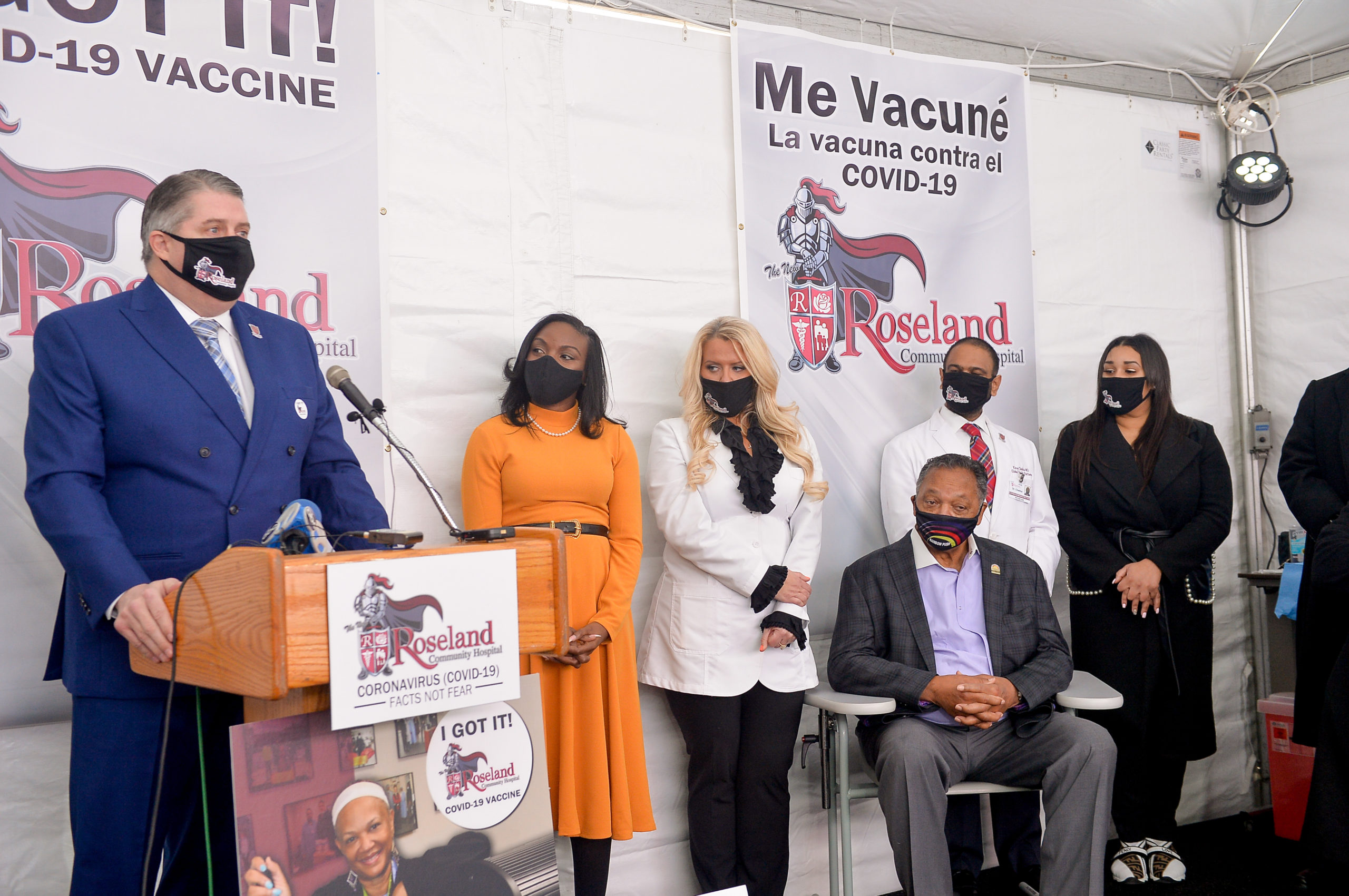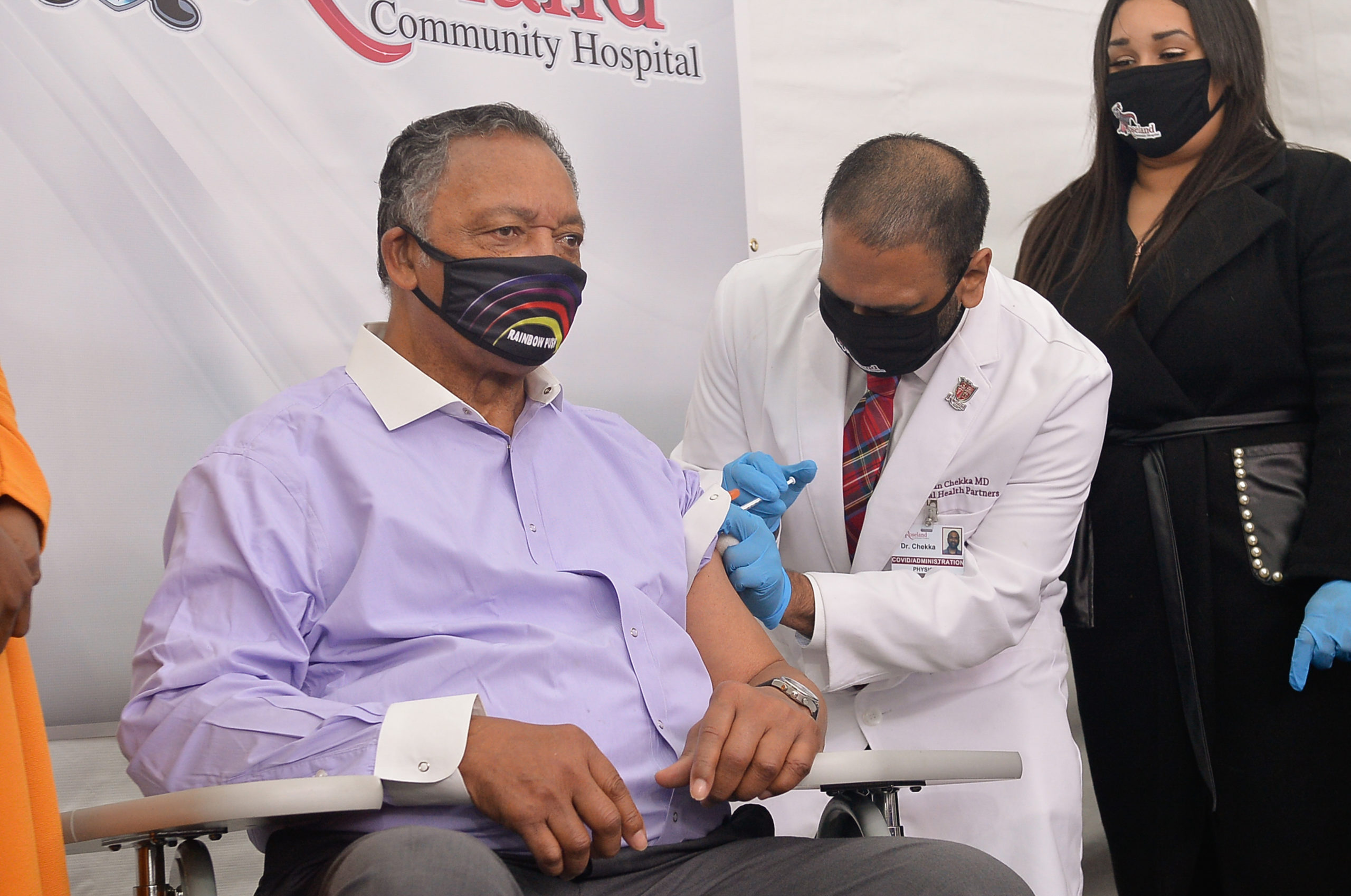Because African Americans and communities of color are a huge percentage of coronavirus cases, Reverend Jesse Jackson, Sr. on Friday, January 8, voluntarily became another public figure to take the Pfizer/BioNTech COVID-19 vaccine to prove it is not only safe but key to saving lives.
Jackson is 79 years old with existing underlying medical conditions, including Parkinson’s disease. He was approved to receive the vaccine by Dr. Victoria Brander, Director of the COVID Preparedness Program at Roseland Community Hospital. The vaccine was administered by Dr. Kiran Chekka, of the Roseland Community Hospital COVID-19 Task Force.
A horde of reporters aimed their cameras at Jackson, looking on as he sat in a chair under a huge white tent in the hospital’s parking lot at, 45 W. 111th St. as the Pfizer/BioNTech COVID-19 vaccine was administered.
Thanking hospital officials for giving him the opportunity to take the COVID-19 vaccine, Jackson expressed sadness that “4,000 people died yesterday [January 7] and the number is still rising. African Americans have been the first victims of the crisis and cannot be last to be recipients of the relief.
Jackson wanted to take the vaccine to help reduce the fears of experimentation that linger within the African American community. Many still remember the 1932 Tuskegee experiment where scientists experimented with 600 mostly Black sharecroppers in Alabama. They were doing research to study treatment for syphilis. The men did not receive any treatment or care during the course of the study.
Jackson said those men were “victims of racial policies. They were victims of misinformation. We must be better than that.” He urged people to continue wearing their masks, saying masking matters, and to utilize social distancing and hand sanitation practices.
Jackson blamed the rise of COVID-19 on poverty, people living in urban areas riding public transportation, underemployed people and a number of them living in homes where sometimes three generations live together. That interaction is another reason why COVID-19 is on the rise in communities of color.
By taking the vaccine, Jackson hopes to erase the medical suspicions that exist in the Black community because, “many people of color are the most affected by COVID-19.”
“We will be fighting to get our fair share of vaccines,” vowed Jackson. He thanked Dr. Kizzmekia Corbett for her work in discovering a remedy for the virus. Corbett is a research fellow and the scientific lead for the Coronavirus Vaccines & Immuno-pathogenesis team at the National Institutes of Health (NIH).
An expert on the global race for a SARS-CoV-2 vaccine, Corbett is one of the NIH’s leading scientists behind the government’s search for a vaccine, and part of a team at NIH that worked with Moderna, the pharmaceutical company that developed one of the two mRNA vaccines that is more than 90 percent effective.
Introduced by Jackson, Corbett said, “What is really interesting about this vaccine is that it is one of the only ways we are going to get ourselves out of this pandemic.
“About two people died per minute in the U.S. yesterday [January 7], and our community definitely had the brunt of the cases and the deaths,” Corbett said.
“Because this vaccine was so adequately tested in Phase One, Phase Two and Phase Three at the efficacy trials, showing that the vaccine is 94 percent, 95 percent” effective, “It is on us and our communities to understand that knowledge and the science that went behind that vaccine in order for us to be informed on whether we are going to take it or not.”
Corbett was the scientific lead for the Coronavirus team at the National Institutes of Health in the Vaccine Research Center where she worked under the leadership of Dr. Anthony Fauci, the nation’s top infectious disease expert, and under the immediate laboratory of Dr. Bernie Brown.
Since she has earned her Ph.D., in joining the lab of the NIH, Corbett has studied coronavirus in depth for six years. That is why scientists understood how to make a really great vaccine effective towards coronaviruses, because they possessed the knowledge that they have a potential to cause a pandemic “like we are seeing today,” she said.
Under the umbrella of vaccine development, Corbett said they partnered with pharmaceutical company Moderna, which uses messenger RNA technology to deliver therapeutics in a safe and effective manner.
To help achieve its goals, Moderna received $955 million of commitments from the federal government’s Biomedical Advanced Research and Development Authority (BARDA).
Corbett said the vaccine Jackson received is also a messenger RNA candidate. “That vaccine will teach his body how to specifically defend itself against the virus of COVID-19,” so that he can become immune.
Tim Egan, president and CEO of Roseland Community Hospital, commented that Jackson had to sit for 15 minutes after taking the vaccine to determine whether he had any adverse reactions and said, “What we need is change. Earlier in 2020, we knew that COVID-19 would have an adverse impact on the Roseland community.

“We created one of the most aggressive testing programs out of any hospitals, not only in Chicago, Illinois but in the U.S. We’ve tested over 25,000 people in the greater Roseland community and across the city of Chicago for COVID-19,” Egan said.
“We want to do the same thing with the vaccinations. We took the testing on the road, going out in the communities where people live and we gave them the test. We want to do the same thing with the vaccines.
“This is why it is so important that Reverend Jackson is here today to help us overcome those obstacles, especially for our own employees who are refusing to get the vaccination,” Egan said.
“One of our employees told me that she read on Facebook that the vaccine might cause MS, but as one scientific fact that I know about Facebook, it sure as hell didn’t graduate from medical school,” Egan told reporters. “Here at Roseland, we are with the scientists. We’re with Dr. Corbett. We are with Dr. Fauci, and we’re with the vaccine.”
Looking at Jackson, Egan asked for his help.
“Right now the Black Caucus is down in Springfield fighting for community hospitals like Roseland to have their own bill they have submitted that would change the divestment that has happened over the last decade in Roseland and other community hospitals.
“We’ve lost millions of dollars out of the Medicaid program, and the Black Caucus is trying to change that and bring those dollars back to the Roseland community and other hospitals,” Egan said.
He revealed that late Thursday night the Illinois Health and Hospital Association sent out an email telling legislators to oppose the Black Caucus’ efforts to bring dollars back to communities where people are dying en masse from COVID-19 and other morbidities. Egan asked Jackson’s help in their fight in securing those needed dollars
The bill, HB5548 (HA1)/HB3840 (SA1), is part of the Black Caucus’ legislative package addressing a myriad of inequities in policing and criminal justice, education and workforce development, economic access, equity and opportunity and health care and human services.
Among other objections, the Illinois Health and Hospital Association is in opposition to the bill’s including a proposal to put a moratorium on hospital and service line closures until the end of 2023, and it would require hospitals to revert their bed capacities back to levels at January 1, 2020.
“This is both unworkable and unreasonable,” wrote the Illinois Health and Hospital Association. “Hospitals need financial resources, appropriate staffing and patient volume to maintain service lines and clinical competencies as well as the hospital as a whole.”
They are also opposed to “forcing a hospital to stay open or keep a service line open when they cannot afford to do so, and they don’t have the appropriate staff or they don’t have the patient volume to maintain adequate health care.”
The Rona Reports are stories of Black resilience in the face of the COVID-19 pandemic. As one of Chicago’s Black newspapers with a citywide distribution our mission is to provide readers with factual news and in-depth coverage of its impact in the Black community. The Rona Report is funded by the Facebook Journalism Project Community Network grant.






